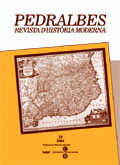Baltasar Gracián: Política de El Político
Keywords:
Gracián, The Politician, politics, Ferdinand the Catholic, Aragon, Counter-Reformation.Abstract
The terms “politics” and “politician” offered a wide range of meanings by Gracián’s times (1601-1658). To the thick Aristotelian and Humanist heritages, there was recently added a new, pejorative meaning, born during the wars of religion, which made it synonymous of Machiavellism. From Counter-Reformation circles, though, both terms received a renewed, favourable meaning as well. The Aragonese Gracián is an outstanding figure in this field. In The Politician (1640) and his other treatises, he made frequent use of both of them. Following current historiographical concern on political semantics, this article traces the meanings he gave them. Gracián alternated the favourable sense, as the one appearing in the title itself, tantamount to the condition and virtues of a great, Catholic prince, with the negative, accusatory sense. Moreover, it deals with the kind of politics deriving from the book, that is, the model of ruler being proposed. Besides drawing an archetypical portrait of the virtuous prince, according to Ferdinand the Catholic’s idealized pattern, he referred, either directly or obliquely, to many of the contemporary political debates. He did so by means of his characteristic concise, conceptista style, so that it should be analysed. Thus, this article takes Gracián as a vantage point from which one can look over to Spanish political thought.
Downloads
Published
How to Cite
Issue
Section
License
Copyright (c) 2004 Xavier Gil Pujol

This work is licensed under a Creative Commons Attribution-ShareAlike 4.0 International License.
Authors must agree with the following terms:
1. The author keeps authorship rights, ceding the journal the right to first publication.
2. Texts will be disseminated with a Creative Commons Attribution 4.0 International License. Which allows for the work to be shared with third parties, as long as they recognise the work’s authorship, the original publication in the journal and licensing conditions.
This requires acknowledging authorship appropriately, providing a link to the license, and indicating if any changes have been made. It can be indicated in any reasonable way, but not in a manner that suggests the licensor endorses or sponsors the use of the text.
If content is remixed, transformed, or new content is created from the journal's texts, it must be distributed under the same license as the original text



